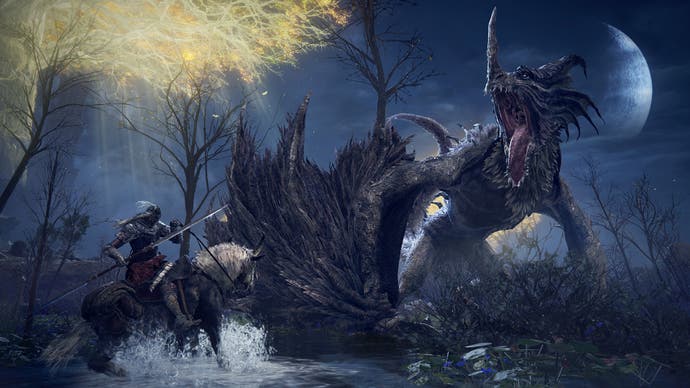Our 2022 Game of the Year: will Elden Ring be the last of its kind?
And happy 2023!
Blood on moss, tattered horrors taking to the sky: Elden Ring is Eurogamer's Game of 2022. And it feels odd to say that, even if it was never really in doubt. Perhaps it feels odd to say that because it was never really in doubt. Elden Ring got roughly double the votes of the closest runner-up when we polled staff and freelancers. Over the last few weeks, games site after games site has announced that Elden Ring is the game they loved most this year. In 2022 Elden Ring is inevitable.
Real talk: at first, we were a little underwhelmed by our own choice. Not by the game, which is a grim marvel. But by that feeling of giving way to the inevitable. A game of the year pick should hit with a sense of surprise before it settles in and feels like the only choice we could ever have made. Elden Ring has a lot of the second part of that, but the first part? It was never going to feel like a surprise.
And yet. And yet, isn't that the surprise? And isn't that the thing worth celebrating? Let's step back so we don't accidentally frame Elden Ring's success through the lens of editorial decisions. Right. Isn't it kind of incredible that a game as wilful, as strange, as distinctive as Elden Ring is not just our pick but also so many people's game of the year in 2022? And isn't that brilliant?
It's a reminder of the course that From Software's games have taken over the last decade or so. Almost everyone who loved the early games in the modern From era - Demon's Souls, even the first Dark Souls - has a story about discovering this brilliant, odd, maddening thing that felt like it was a huge secret. Everyone has a story about working out - often painfully - how these games worked. And how these games thought: the choices they made and the choices they wanted their players to make. Everyone has a story about trying to win someone else over too: I'm playing this game at the moment, and there's just nothing else like it. It doesn't explain anything. Multiplayer is terrifying. I literally don't know what's coming next.
These people who were in at the start - they did win other people over. Dark Souls was quietly big: decent sales but absolutely barnstorming success in terms of how it made other designers, other developers and publishers take note. The sequels were bigger. Bloodborne was bigger. Sekiro was massive, and now Elden Ring was the kind of game that other games got out of the way of. Elden Ring was a blockbuster. A tentpole. The daddy, to use the term beloved of former Eurogamer editor Oli Welsh.
And it wasn't just From games themselves. Over the last few years, so many different games from different developers have borrowed a bit of the From Software design, which means they've learned to push players a bit harder, to punish them a bit more, to hide their secrets and knot their worlds together in the way that From Software taught them to. Soulsborne games can be played pretty straight, like Steelrising, or they can be viewed through strange, personal lenses, as is the case with something like Death's Door. The From Software formula has transformed the Double-A scene, but it's also warped huge blockbusters. Even Zelda was paying attention.

This is weird, in a way, because it takes the sheer heft of individuality in the Dark Souls games, their sense of distinct authorship, and turns it into the dogma of genre. And there are problems, even with the From stuff - its lack of thought regarding accessibility, including cognitive accessibility, for starters. But it's also kind of wonderful, because, out of all the futures games had to choose between eight or nine years ago - games as service, open-world Ubi-formulas, all that jazz - a huge chunk of the audience chose something that was weird and abstruse and whose magic could be perilous to unearth. They chose distinct games, odd games, games that were worth talking, writing, reading about. Games that are worth getting angry about when their accessibility thinking falls very short. Games that took you to places where you genuinely did not know what was coming next.
And this is the final point. Elden Ring isn't just the biggest Soulsy game yet. It also feels like it's going to be the last one for a while. From has already announced that its next game is something very different, and there's also a sense that as good as follow-ups will be, they will be missing the magic of the early games purely because what was once hidden and obscure is now thoroughly visible, thoroughly understood. We know how the trick works, and while it's still an absolute pleasure to watch it performed again, that spark, that of feeling of being absolutely flattened by something unprecedented, is a lot harder to come by.
This is good too, really. From gets to do something new - and possibly, with it, lead the whole industry in a fresh direction. And we all get to enjoy that feeling that From games have made us value. Once again, we don't know what's coming next. Happy 2023 all!
















